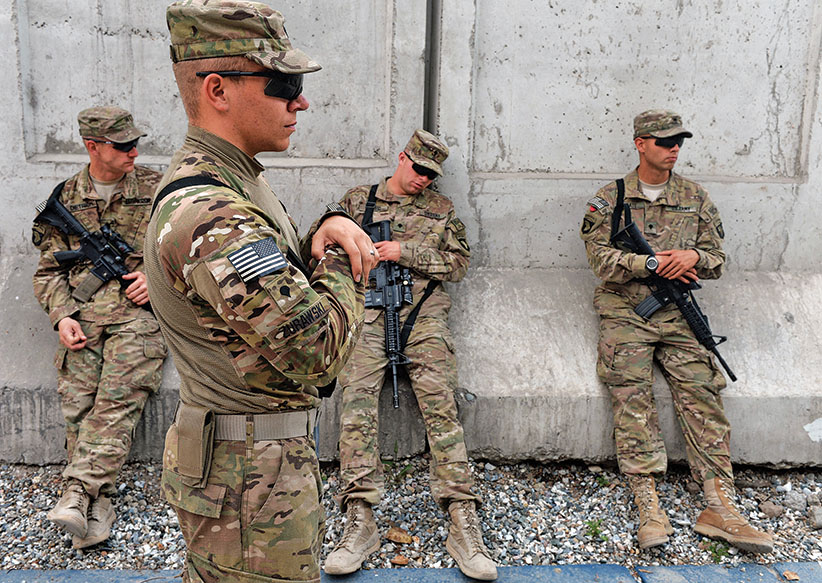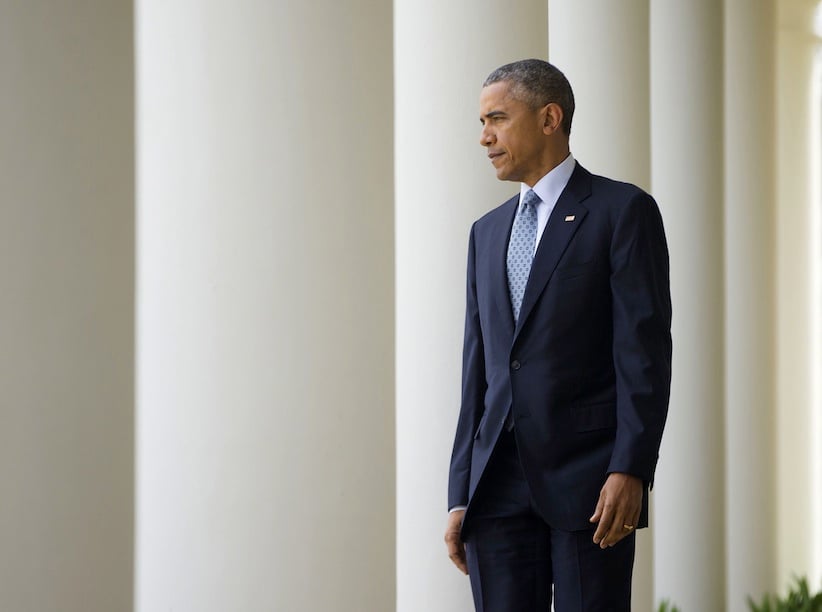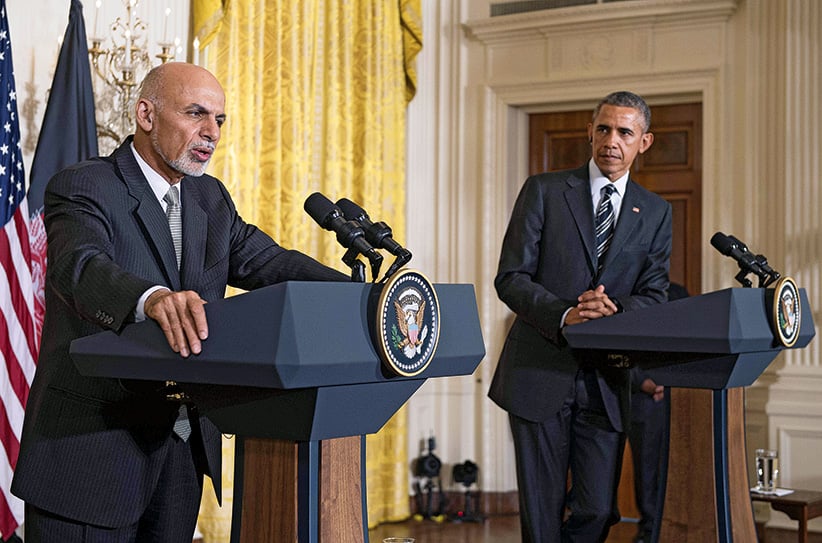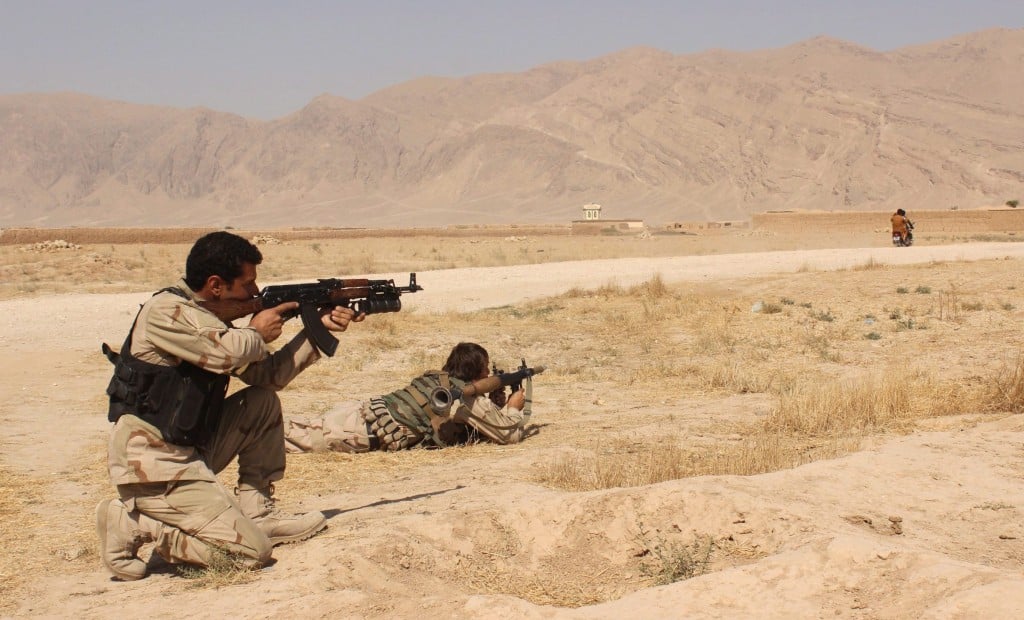Why America won’t exit Afghanistan any time soon
Barack Obama vowed to withdraw from America’s ‘longest war.’ Now, he’s having to face the reality that Afghanistan is unfixable.
US soldiers of the Combined Team Nangarhar of the CT Bastogne, 1st Brigade Combat Team, 101st Airborne Division (Air Assault) of the United States take a break after an award ceremony at Forward Operating Base, Finley Shields in Jalalabad in Nangarhar province on April 6, 2013. An estimated 100,000 foreign troops have been fighting the Taliban for the past 11 years and are due to leave Afghanistan by December 31, 2014 to be replaced by a smaller contingent to train and advise their local counterparts. (Manjunath Kiran/AFP/Getty Images)
Share

American President Barack Obama will not end his country’s wars in the Middle East after all.
Obama campaigned for the presidency on a pledge to end America’s conflict in Iraq, and, shortly after his election, promised to pull all American troops from that country by the end of 2011. He brought the troops home as promised, but more than 3,000 are now back, helping to battle an insurgency by the so-called Islamic State jihadist group.
During his 2012 re-election campaign, Obama said he would “end the war in Afghanistan in 2014.” American and NATO troops duly held a ceremony that December to mark the transition in their role from combat to support and training. Some 9,800 American troops still remained in the country, but Obama had pledged in May 2014 to halve that by the end of this year, and said that by the end of 2016, “our military will draw down to a normal embassy presence in Kabul.”
Last week, citing an enduring American commitment to the country, he said the 9,800 U.S. troops still there would stay through most of next year. Some 5,500 will remain when Obama exits the White House in January 2017, dispersed at bases throughout the country.
Obama had often framed his time in office as the antithesis to that of his predecessor, George W. Bush, who began America’s wars in Afghanistan and Iraq. Obama wanted to avoid entangling America in new open-ended wars, and tried to “responsibly end” the ones it was already fighting. “The tide of war is receding,” the President liked to say when publicly discussing American military withdrawals.
It was an unfortunate metaphor, propelled more by wishful thinking than dispassionate observation when Obama repeated the phrase on at least three separate occasions in 2011. Besides, as anyone who has watched an ocean for more than 12 hours knows, receding tides come back.
Such was the case in Iraq. Islamic State, an outgrowth of al-Qaeda in Iraq, stormed through the country in June 2014 and now controls large chunks of Iraq and next-door Syria. America’s absence from that war lasted less than three years.
In Afghanistan, more than 5,000 Afghan troops died this year fighting the Taliban and other insurgent groups. While Afghan government troops hold most major population centres, the Taliban is strong in rural areas.
Weeks ago, those insurgents briefly took a provincial capital, Kunduz. American special forces troops who were reportedly advising Afghan soldiers exchanged fire with Taliban fighters. America also launched supportive air strikes, several of which hit a hospital run by the international charity Doctors Without Borders, killing at least 22 people, including staff and patients. Obama apologized for the attack.
Kunduz was quickly retaken, but the Taliban assault demonstrated their persistent strength. Sources inside the city reached by Maclean’s said it was ripe for the taking. For years, Kunduz, like much of Afghanistan, has suffered from a corrupt police force and local militias driven more by financial considerations and ethnic alliances than loyalties to the state.

Obama’s rhetoric about America’s drawdown was looking more and more disconnected from reality. Gen. John Campbell, the top commander of U.S. troops in Afghanistan, said as much to a Senate committee earlier this month: “Based on conditions on the ground, I do believe we have to provide our senior leadership options different than the current plan we are going with,” he said.
The President says the nature of the American mission in Afghanistan will not change. The troops that stay will be involved in training Afghan forces and counterterrorism (though the latter definition leaves room for interpretation, as U.S. actions in Kunduz demonstrated).
The announced extension, however, is significant—for Obama’s presidency and for Afghanistan itself. Obama inherited two wars. One, in Iraq, he never believed America should have launched in the first place. Afghanistan was the conflict he used to call the “good war,” the one America had to fight.
His belligerence, however, was always mitigated by an aversion to long military engagements. When he ordered 30,000 American troops to “surge” into Afghanistan in 2009, he also set a date to begin pulling them back, 18 months later. He wanted to end America’s “good war” in Afghanistan as badly as he wanted to end the bad one in Iraq. Instead, he’ll bequeath both conflicts to his successor.
For a President who pointedly called Afghanistan America’s “longest war,” as he plotted its end barely a year ago, prolonging that war must have been an uncomfortable choice to make. But, however much Obama might have wanted to extract America from the war in Afghanistan—however attainable that goal might have seemed to him when he promised to meet it—America still has unfinished business there.
“Maintaining American troops in Afghanistan can in no way slow down the rapid progress of our jihad and struggle,” the Taliban said in a written statement issued last Friday.
The Taliban’s progress of late is indeed one of the factors that motivated Obama’s decision, but it’s not the only one, says James Dobbins, who served as Obama’s special representative for Afghanistan and Pakistan from 2013 to 2014, and, prior to that, was America’s representative to the Afghan opposition under George W. Bush.
“You have to go back to when he last made his decision, then look at the things that have happened since,” says Dobbins, referring to Obama’s May 2014 speech in which he set a timetable to bring all but embassy-bound soldiers home by the end of 2016. “Two weeks later, the Iraqi army collapsed, and Islamic State seized a large portion of Iraq,” he notes, an event that demonstrated how quickly what America built up in a fragile foreign state could unravel.

Afghanistan’s post-9/11 president, Hamid Karzai, was then replaced by former World Bank executive Ashraf Ghani. The new government, says Dobbins, now a senior fellow at the Rand Corporation, was “considerably more co-operative, more friendly, more grateful,” and it “specifically asked for the United States to sustain its commitment beyond 2016.”
Related: Our 2014 interview with Ashraf Ghani
Other factors included Islamic State making inroads in Afghanistan, and the breakdown of peace talks between the Taliban and the Afghan government after it emerged this summer that the Taliban’s leader, Mullah Mohammed Omar, had in fact died two years earlier, reportedly in a Pakistani hospital. Both developments underlined Afghanistan’s vulnerability—as did the temporary fall of Kunduz.
According to Dobbins, the risks of deepening instability in Afghanistan justify America’s continued intervention there. Total state failure in Afghanistan is unlikely to be contained, he says. “It could become a black hole in which dozens of extremist movements—Uzbek, Tajik, Pashtun, Arab—could operate against the stability of those counties, including Pakistan, which is a nuclear-armed power.”
The troop extension, Dobbins says, is not a particularly burdensome investment. There are more American troops currently deployed in South Korea, he notes. And he says the gains Afghanistan has made since 9/11 are worth protecting. “It’s made startling advances in terms of longevity, in terms of literacy and in terms of the role of women,” he says. “That would be rolled back pretty quickly if we abandoned it at this stage.”
Ali Mohammad Ali, a political and security analyst in Kabul, says the troop extension will not be enough to help Afghanistan defeat the Taliban. Far more foreign troops were in the country before now, and insurgent groups could not be stamped out. But Ali says the extension will likely allow Afghan forces to hold the ground they have now. He says it will also provide a psychological boost to the Afghan government and security forces to know they continue to enjoy American support. And he believes the extension will result in pressure on Pakistan, a country he says has an “agenda of controlling Afghanistan,” to end its support for the Taliban.
Support and shelter for the Afghan Taliban by Pakistan’s military and its Inter-Services Intelligence (ISI) spy agency is well-established. But Obama, in his speech announcing the troop extension, made only passing and somewhat oblique reference to it. “Sanctuaries for the Taliban and other terrorists must end,” he said, before noting he would be hosting Pakistani Prime Minister Nawaz Sharif the following week. “And I will continue to urge all parties in the region to press the Taliban to return to peace talks and to do their part in pursuit of the peace that Afghans deserve,” he said.
According to Aimal Faizi, an Afghan journalist who was a spokesperson for Karzai during his presidency, America’s reluctance to directly confront “outside” state support for the Taliban and other insurgent groups means no amount of U.S. troops in the country will benefit Afghanistan’s peace and security.
“We should not continue fooling ourselves that the Taliban and other violent groups are soldiers of Islam, or they are genuinely fighting the infidels for the cause of Islam,” he said in an email interview. “It is a fake political mask on a group of individuals who are being used by states or state-created and -supported structures against Afghanistan for political ends and raison d’État. Therefore, without addressing the sources of motivation for the terrorist groups, any strategy to eliminate them militarily . . . will be of no effect.”

Exactly how America should address Pakistan’s relationship with the Taliban has confounded American policy-makers since 9/11. Thomas Ruttig, co-director of the Afghanistan Analysts Network in Kabul, says the Taliban are “not marionettes” of Pakistan. “They’re also players in their own right, and that needs to be accepted,” he says.
The relationship is nevertheless extremely close. Pakistan’s defence strategy is built on the idea of having “strategic depth,” to its west, and that means a compliant government in Afghanistan. The Taliban fit the bill. And if they’re not going to run things from Kabul, they can destabilize any government that tries.
Dobbins believes the most effective approach is to target Pakistan’s military, which receives billions of dollars worth of American military assistance, rather than its civilian government, which has limited control over its military and the ISI. “Our military assistance and our military collaboration with Pakistan should be conditional on more effective behaviour against the Afghan Taliban and associated groups.”
Christine Fair, an associate professor of peace and security studies at Georgetown University, says America should be more coercive. “There is an unwillingness to treat Pakistan like an enemy,” she says. This is because America fears Pakistan’s nuclear weapons might fall into the hands of terrorists if the state is weakened, and because it believes Pakistan might stop co-operating against al-Qaeda and other transnational anti-American terrorist groups if Washington cuts its military assistance.
Fair supports the American troop extension, but she cautions it won’t be sufficient on its own to ensure Afghanistan’s long-term stability. Pakistan’s support for Afghan insurgent groups is one problem. Another is the size of the Afghan state, including its security forces, which she says are too big and expensive to sustain themselves. “But it’s very difficult to downsize security forces when you’re fighting an insurgency, because anyone that you downsize, they go to the insurgents,” she says.
Fair says Afghanistan’s future depends on its economic viability: generating enough revenue to pay for its own soldiers and police. Eventually, and inevitably, she says, America will stop footing the bill.
This requires the Afghan government to reduce corruption and graft, to fairly and effectively tax its citizens, and to monetize some of Afghanistan’s natural resources. Its ability to exploit that buried wealth is frustrated by a shortage of skilled workers, and a lack of dependable electricity and transportation infrastructure.
The American troop extension doesn’t remedy any of these deeper problems—not Pakistan’s interference, and not the discrepancy between the size of Afghanistan’s security forces and what it can afford to pay for. America has bought Afghanistan a bit more time. It was probably a necessary step, but it’s a modest one. Afghanistan will have to tackle its more fundamental problems on its own. That’s a challenge that may outlast Obama’s successor, as well.